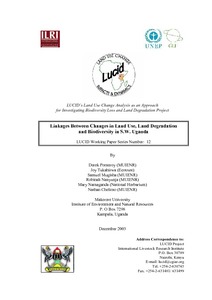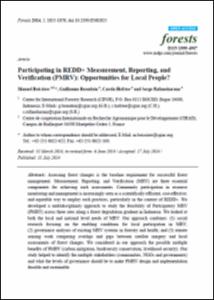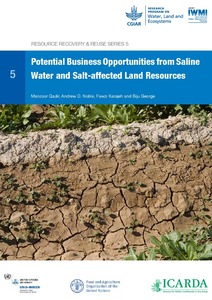Livestock and water interactions in mixed crop-livestock farming systems of Sub-Saharan Africa: interventions for improved productivity
Focusing on mixed crop-livestock farming systems of Sub-Saharan Africa, this review brings together the available knowledge in the various components of the livestock and water sectors. Through an analysis of livestock-water interactions, promising strategies and interventions to improve Livestock Water Productivity are proposed. In the biophysical domain, the numerous interventions relate to feed, water and animal management. These are interlinked with interventions in the socio-political-economic domain.
Mapping land degradation patterns using NDVI as a Proxy: a case study of Kenya
Participating in REDD+ Measurement, Reporting, and Verification (PMRV): Opportunities for Local People?
Assessing forest changes is the baseline requirement for successful forest management. Measurement, Reporting, and Verification (MRV) are three essential components for achieving such assessments. Community participation in resource monitoring and management is increasingly seen as a scientifically efficient, cost-effective, and equitable way to employ such practices, particularly in the context of REDD+. We developed a multidisciplinary approach to study the feasibility of Participatory MRV (PMRV) across three sites along a forest degradation gradient in Indonesia.
Potential business opportunities from saline water and salt-affected land resources
Proceedings of the Launching Workshop of the Agricultural Water Management Platform, Addis Ababa, Ethiopia, 15-16 January 2015
Quesungual slash mulch agroforestry systems (QSMAS): improving crop water productivity, food security and resource quality in the sub-humid tropics
Rehabilitacion de areas degradadas en la Amazonia peruana: revision de experiencias y lecciones aprendidas
The study was caried out in Peru in 2003 and 2004. The study aims to increase the chances of future success of forest rehabilitation efforts by identifying the strategies that best contribute to long-term sustainability with minimal negative effects on stakeholders. Specifically, the study derives strategic lessons from the past and ongoing initiatives. The study identifies and disseminate the most promising approaches and incentives for rehabilitation in different ecological and socio-economic situations.
Rehabilitation of degraded land in India through community-based initiatives
Employs participatory approach to rehabilitate common property resources by developing biodiesel plantations through 1) consortium approach among govt. line departments, NGOs, CBOs, and ICRISAT; and 2) collective action
Romper los ciclos de degradacion de la tierra: estudio de un caso en Ban Lak Sip, Republica Democratica Popular Lao. In SpanishBreaking the cycles of land degradation: a case study from Ban Lak Sip, Lao PDR
This issue of Water Policy Briefing is based on research presented in When ?Conservation? Leads to Land Degradation: Lessons from Ban Lak Sip, Laos (IWMI Research Report 91) by Guillaume Lestrelin, Mark Giordano and Bounmy Keohavong. The research was carried out by the Managing Soil Erosion Consortium (MSEC)?a multi-country collaborative effort to better understand land degradation, and potential solutions, in upland areas of Southeast Asia. MSEC is coordinated by IWMI with substantial contributions from France?s Institute of Research for Development (IRD).




